Dialysis Nurse Resume Examples

Jul 18, 2024
|
12 min read
Dialysis nurse resume: Crafting your perfect resume, one detail at a time.
Rated by 348 people
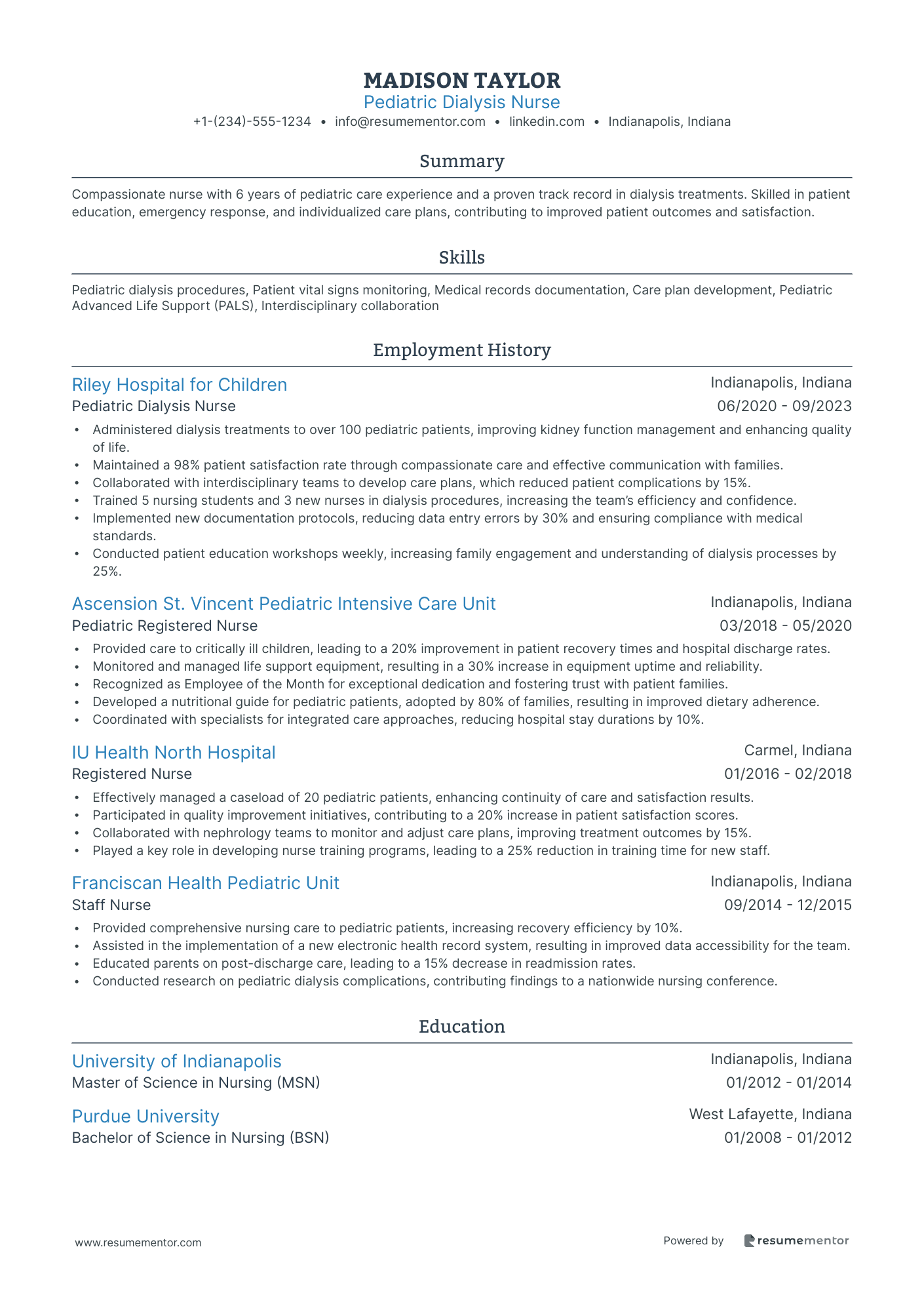
Pediatric Dialysis Nurse
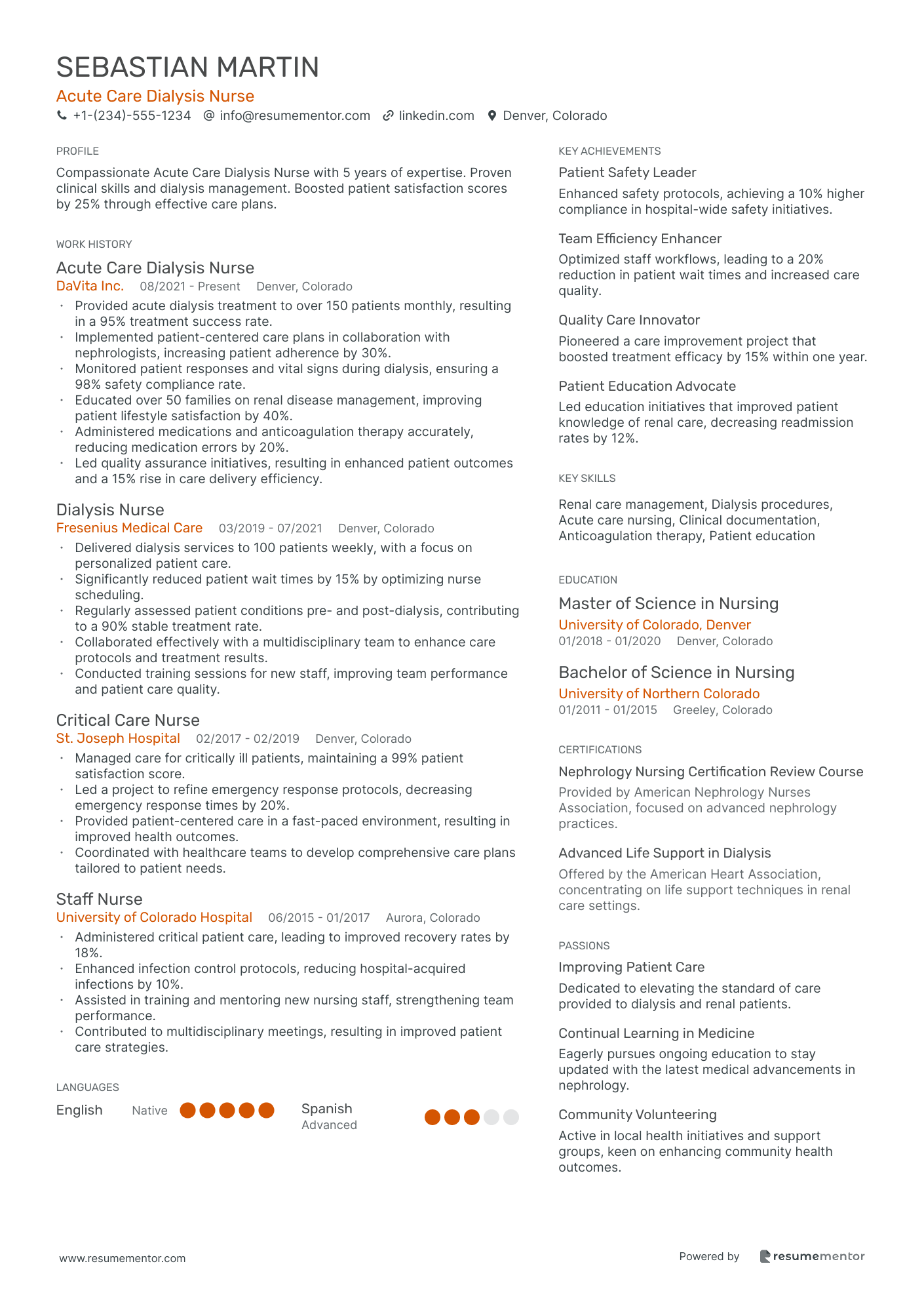
Acute Care Dialysis Nurse
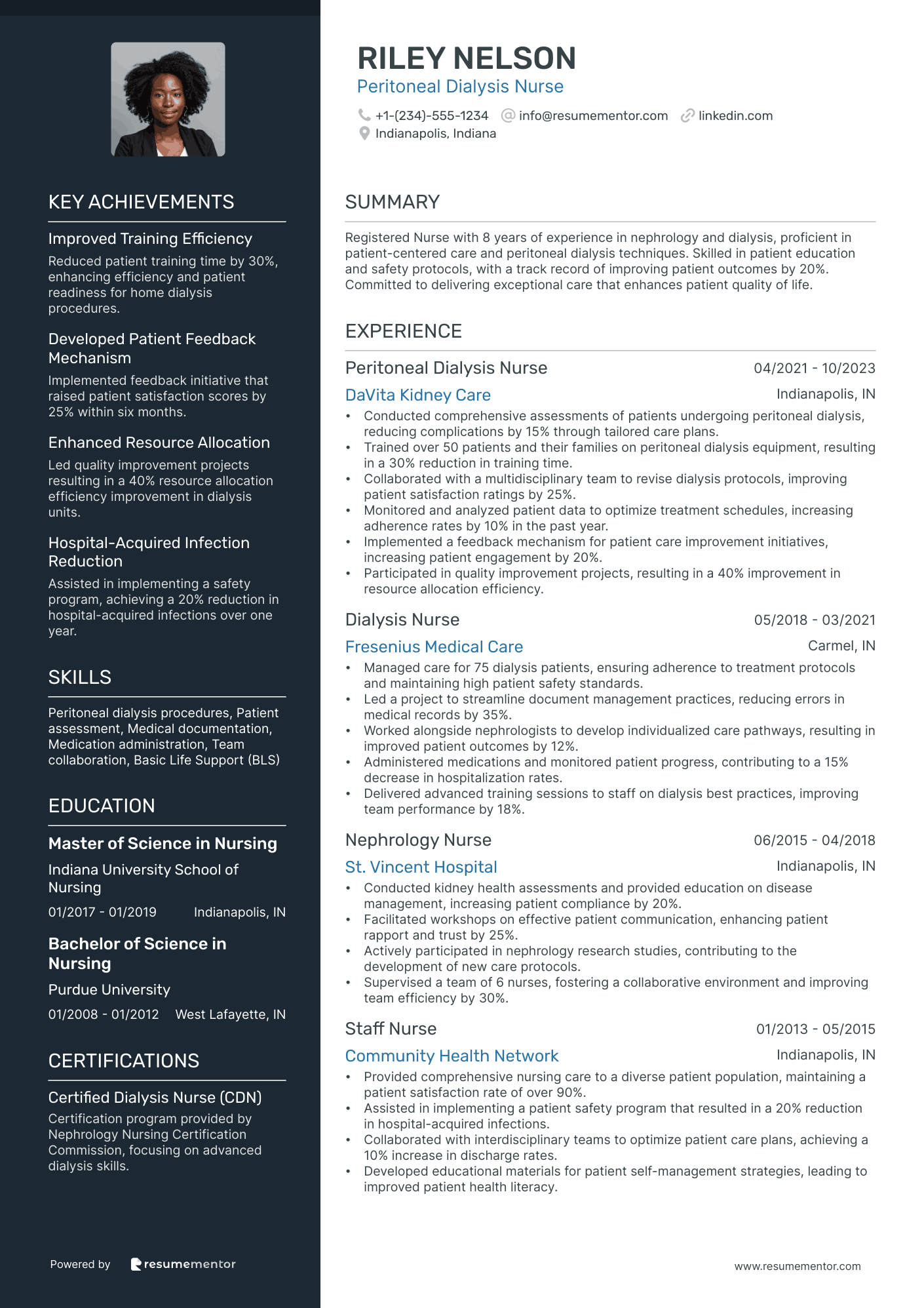
Peritoneal Dialysis Nurse
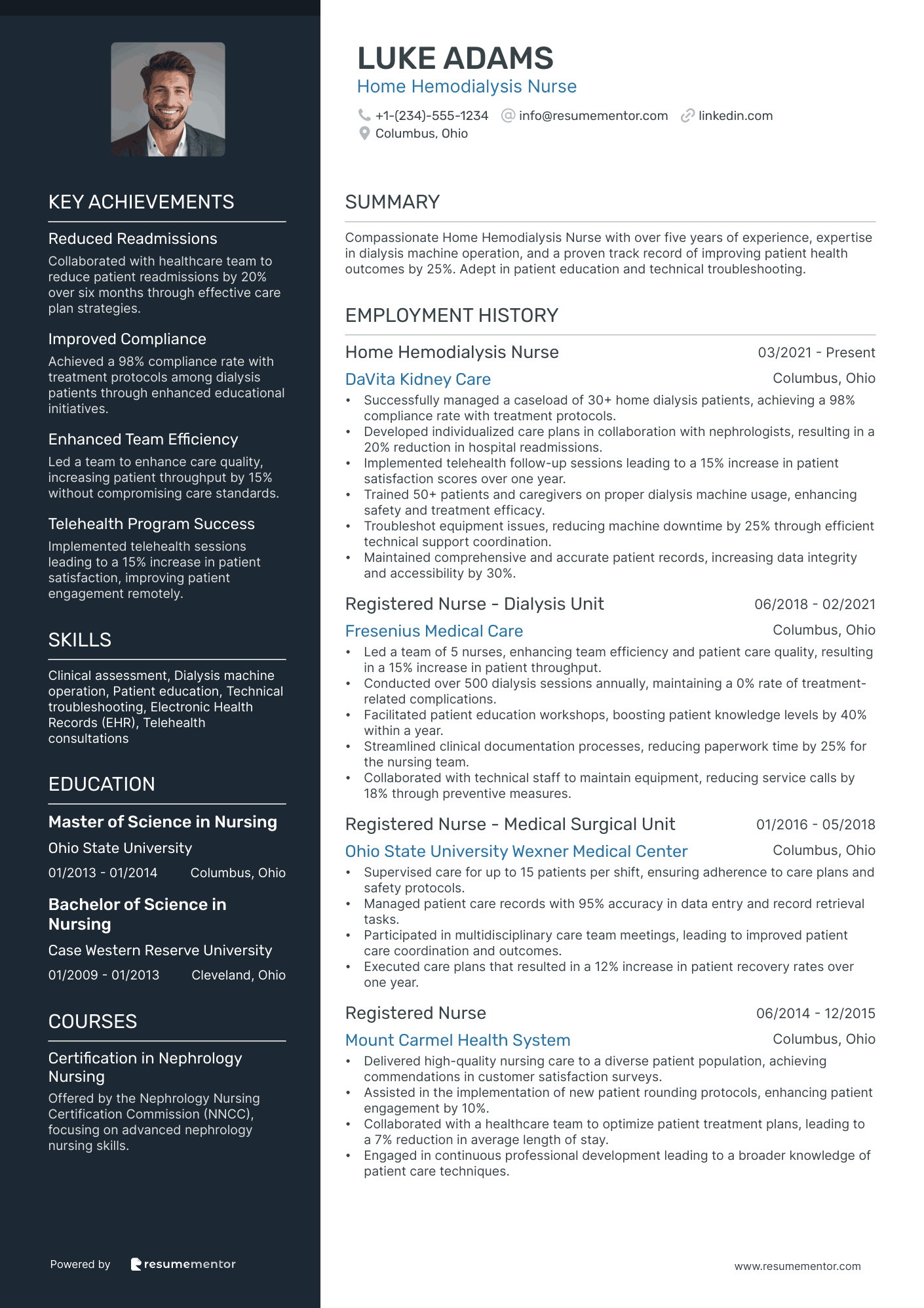
Home Hemodialysis Nurse
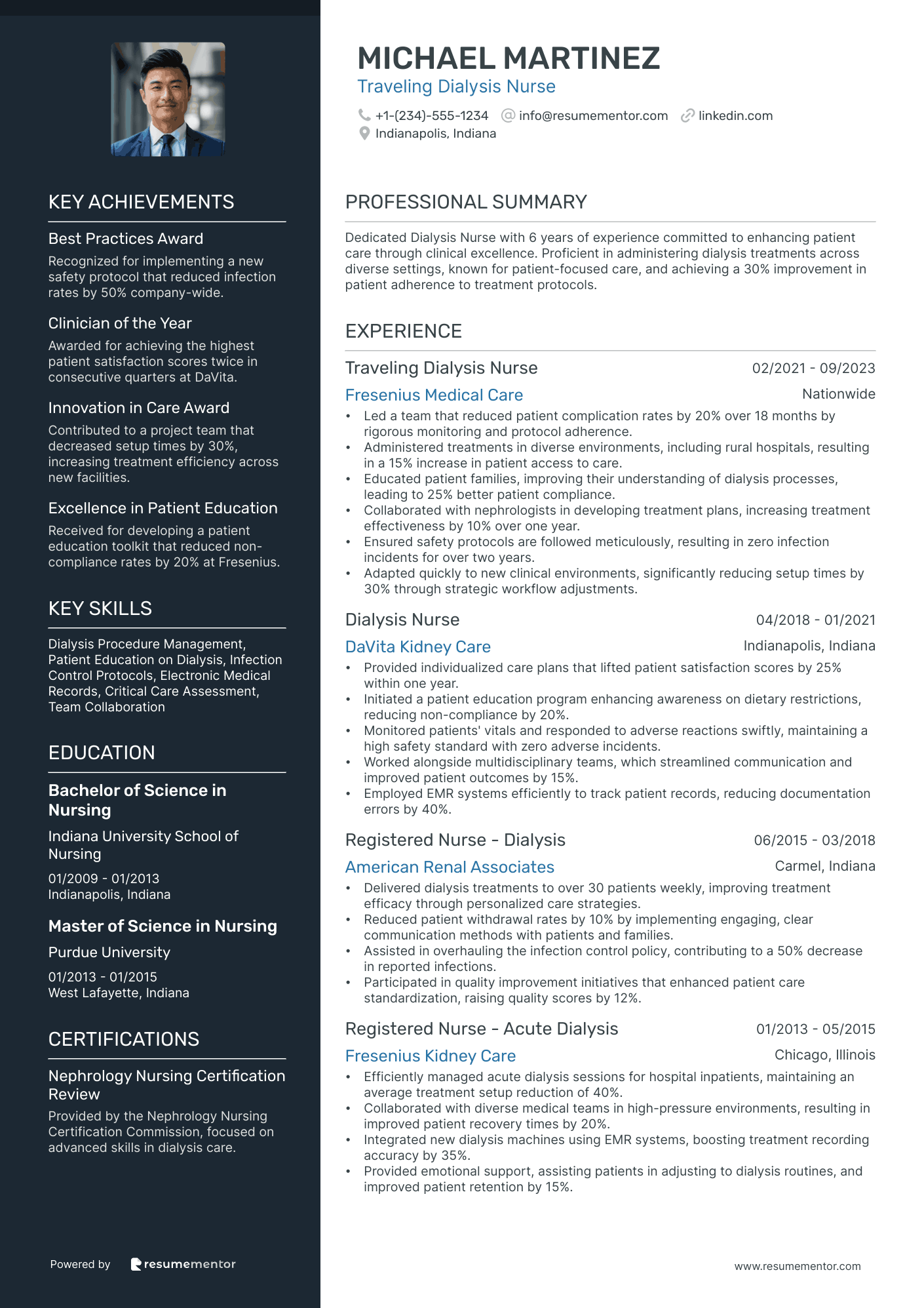
Traveling Dialysis Nurse
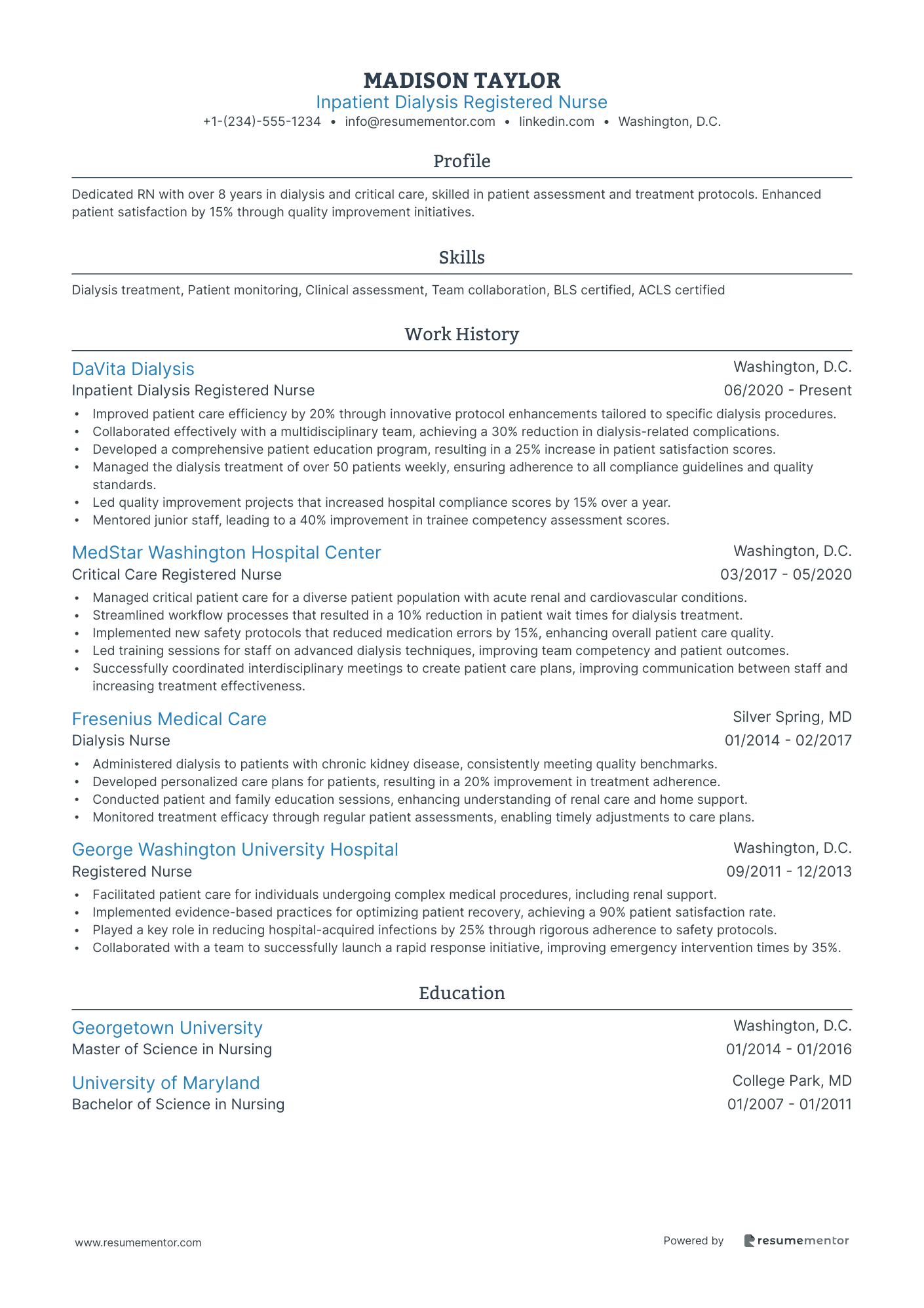
Inpatient Dialysis Registered Nurse
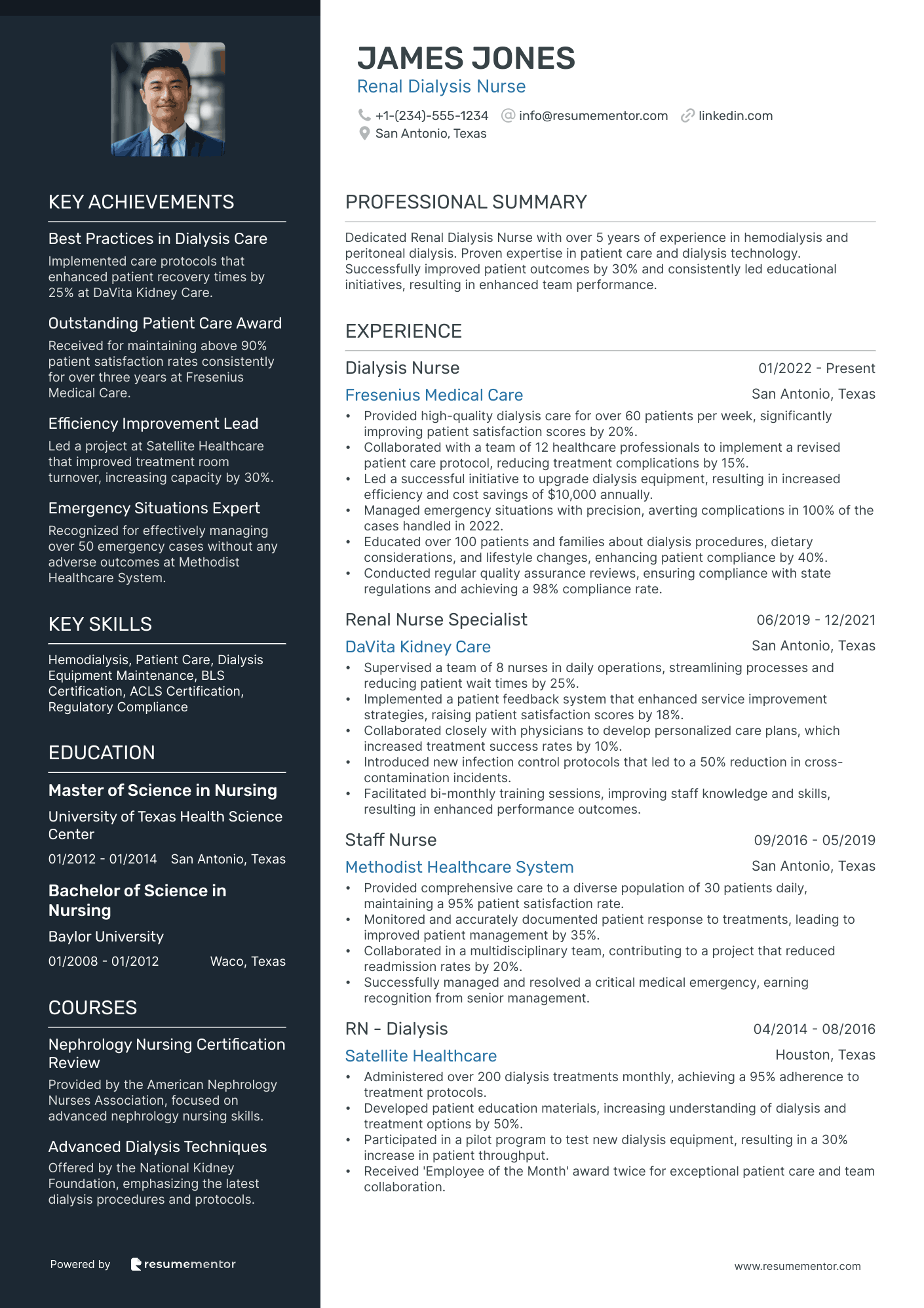
Renal Dialysis Nurse
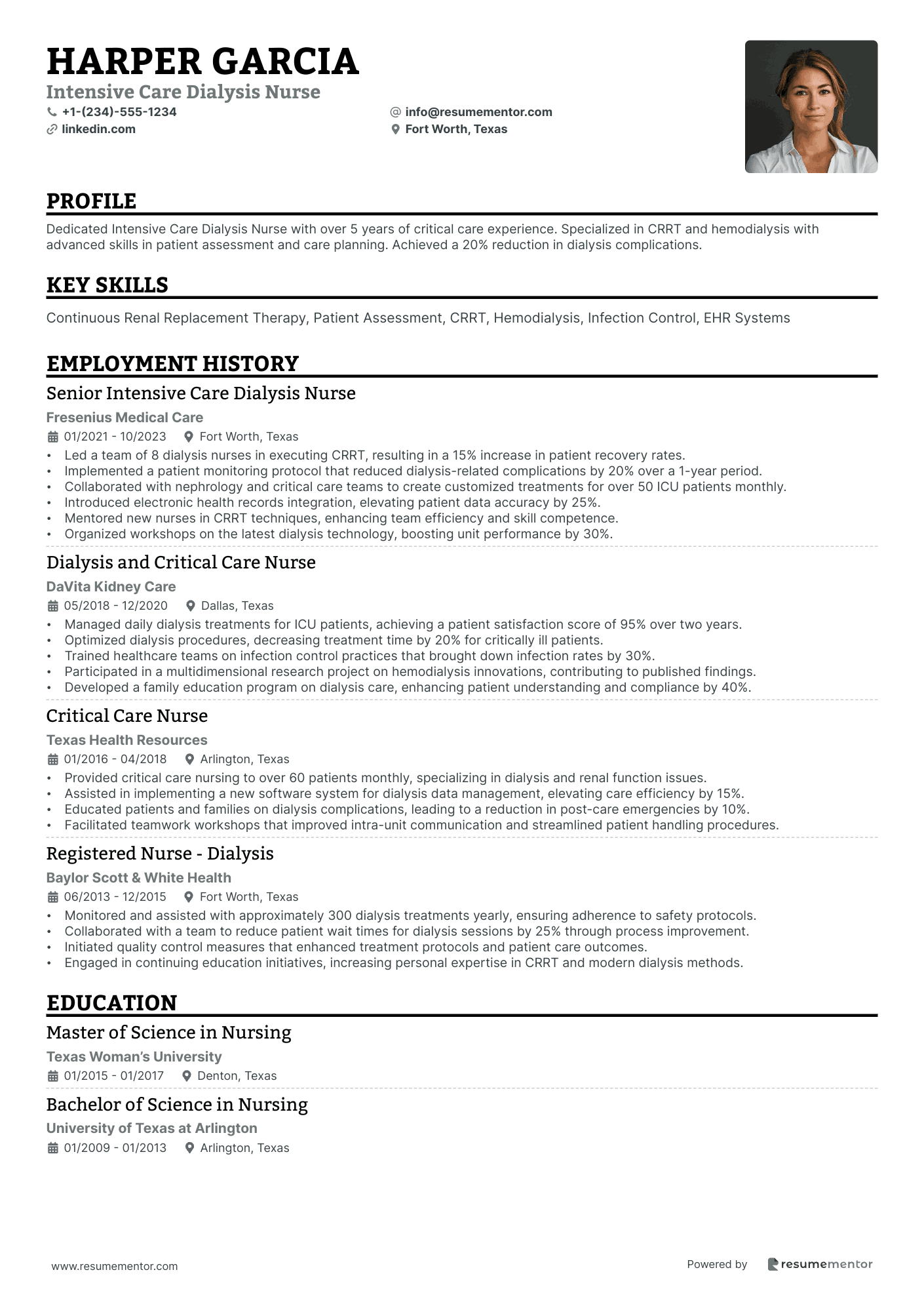
Intensive Care Dialysis Nurse
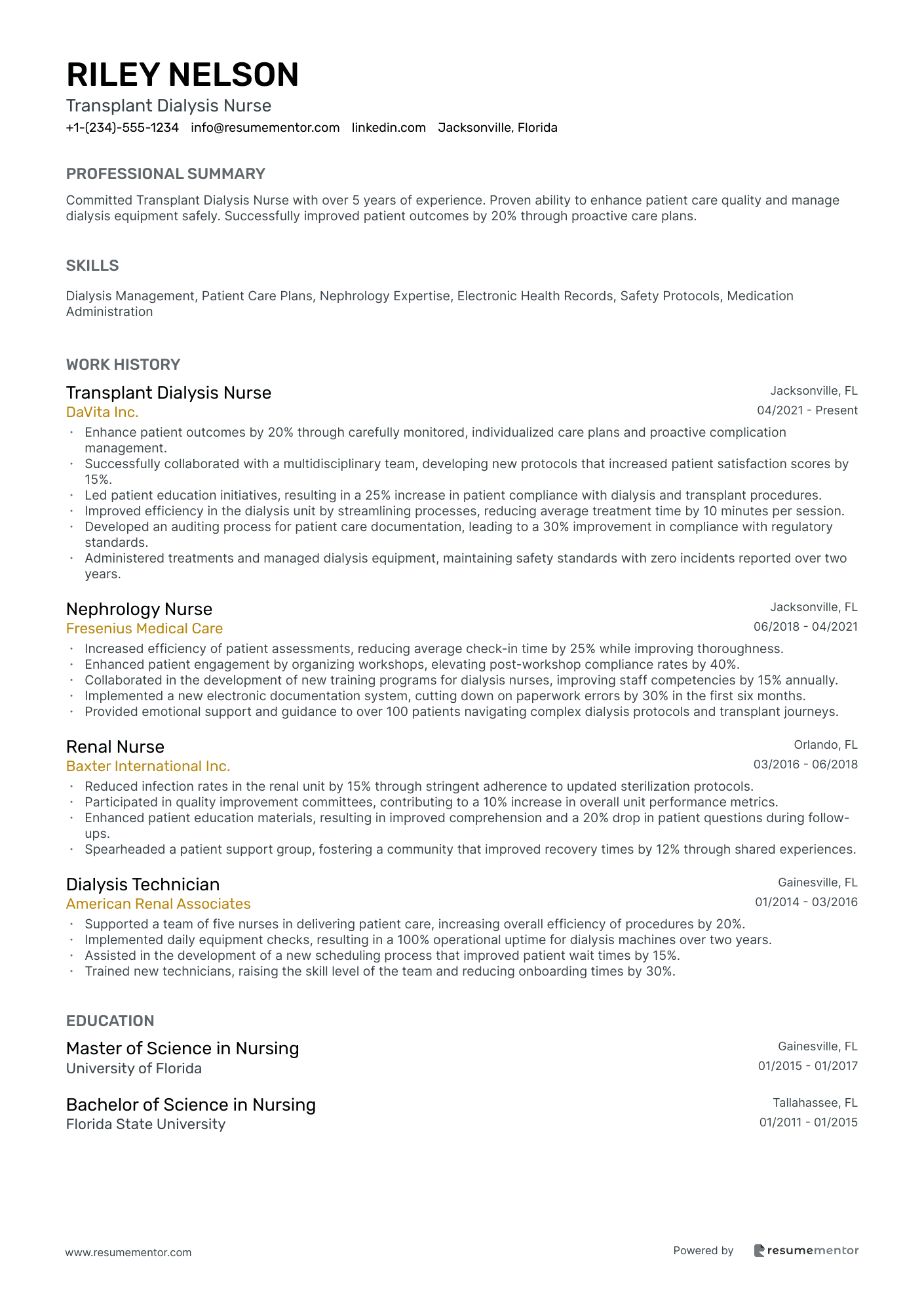
Transplant Dialysis Nurse
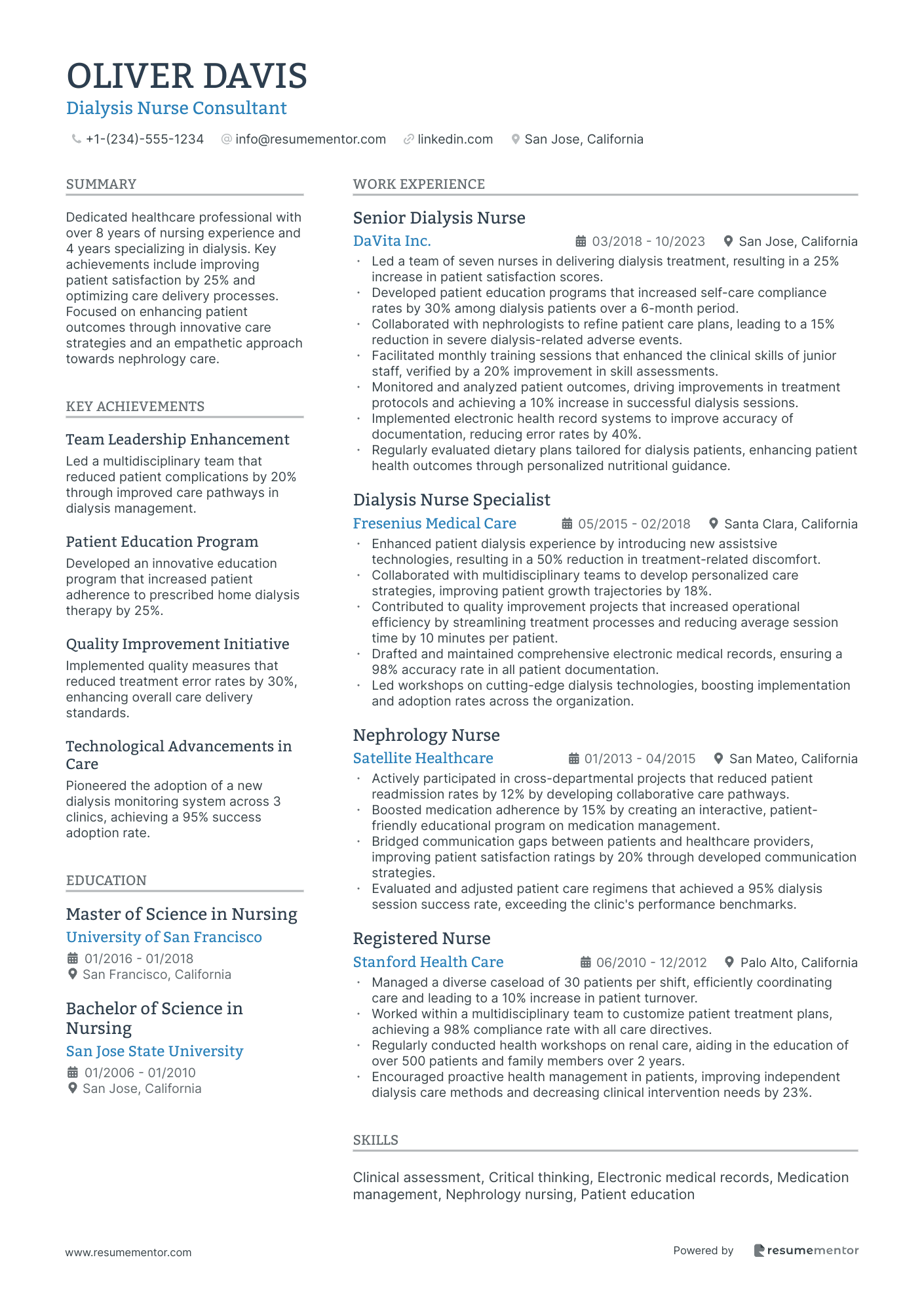
Dialysis Nurse Consultant

Pediatric Dialysis Nurse resume sample
- •Administered dialysis treatments to over 100 pediatric patients, improving kidney function management and enhancing quality of life.
- •Maintained a 98% patient satisfaction rate through compassionate care and effective communication with families.
- •Collaborated with interdisciplinary teams to develop care plans, which reduced patient complications by 15%.
- •Trained 5 nursing students and 3 new nurses in dialysis procedures, increasing the team’s efficiency and confidence.
- •Implemented new documentation protocols, reducing data entry errors by 30% and ensuring compliance with medical standards.
- •Conducted patient education workshops weekly, increasing family engagement and understanding of dialysis processes by 25%.
- •Provided care to critically ill children, leading to a 20% improvement in patient recovery times and hospital discharge rates.
- •Monitored and managed life support equipment, resulting in a 30% increase in equipment uptime and reliability.
- •Recognized as Employee of the Month for exceptional dedication and fostering trust with patient families.
- •Developed a nutritional guide for pediatric patients, adopted by 80% of families, resulting in improved dietary adherence.
- •Coordinated with specialists for integrated care approaches, reducing hospital stay durations by 10%.
- •Effectively managed a caseload of 20 pediatric patients, enhancing continuity of care and satisfaction results.
- •Participated in quality improvement initiatives, contributing to a 20% increase in patient satisfaction scores.
- •Collaborated with nephrology teams to monitor and adjust care plans, improving treatment outcomes by 15%.
- •Played a key role in developing nurse training programs, leading to a 25% reduction in training time for new staff.
- •Provided comprehensive nursing care to pediatric patients, increasing recovery efficiency by 10%.
- •Assisted in the implementation of a new electronic health record system, resulting in improved data accessibility for the team.
- •Educated parents on post-discharge care, leading to a 15% decrease in readmission rates.
- •Conducted research on pediatric dialysis complications, contributing findings to a nationwide nursing conference.
Acute Care Dialysis Nurse resume sample
- •Provided acute dialysis treatment to over 150 patients monthly, resulting in a 95% treatment success rate.
- •Implemented patient-centered care plans in collaboration with nephrologists, increasing patient adherence by 30%.
- •Monitored patient responses and vital signs during dialysis, ensuring a 98% safety compliance rate.
- •Educated over 50 families on renal disease management, improving patient lifestyle satisfaction by 40%.
- •Administered medications and anticoagulation therapy accurately, reducing medication errors by 20%.
- •Led quality assurance initiatives, resulting in enhanced patient outcomes and a 15% rise in care delivery efficiency.
- •Delivered dialysis services to 100 patients weekly, with a focus on personalized patient care.
- •Significantly reduced patient wait times by 15% by optimizing nurse scheduling.
- •Regularly assessed patient conditions pre- and post-dialysis, contributing to a 90% stable treatment rate.
- •Collaborated effectively with a multidisciplinary team to enhance care protocols and treatment results.
- •Conducted training sessions for new staff, improving team performance and patient care quality.
- •Managed care for critically ill patients, maintaining a 99% patient satisfaction score.
- •Led a project to refine emergency response protocols, decreasing emergency response times by 20%.
- •Provided patient-centered care in a fast-paced environment, resulting in improved health outcomes.
- •Coordinated with healthcare teams to develop comprehensive care plans tailored to patient needs.
- •Administered critical patient care, leading to improved recovery rates by 18%.
- •Enhanced infection control protocols, reducing hospital-acquired infections by 10%.
- •Assisted in training and mentoring new nursing staff, strengthening team performance.
- •Contributed to multidisciplinary meetings, resulting in improved patient care strategies.
Peritoneal Dialysis Nurse resume sample
- •Conducted comprehensive assessments of patients undergoing peritoneal dialysis, reducing complications by 15% through tailored care plans.
- •Trained over 50 patients and their families on peritoneal dialysis equipment, resulting in a 30% reduction in training time.
- •Collaborated with a multidisciplinary team to revise dialysis protocols, improving patient satisfaction ratings by 25%.
- •Monitored and analyzed patient data to optimize treatment schedules, increasing adherence rates by 10% in the past year.
- •Implemented a feedback mechanism for patient care improvement initiatives, increasing patient engagement by 20%.
- •Participated in quality improvement projects, resulting in a 40% improvement in resource allocation efficiency.
- •Managed care for 75 dialysis patients, ensuring adherence to treatment protocols and maintaining high patient safety standards.
- •Led a project to streamline document management practices, reducing errors in medical records by 35%.
- •Worked alongside nephrologists to develop individualized care pathways, resulting in improved patient outcomes by 12%.
- •Administered medications and monitored patient progress, contributing to a 15% decrease in hospitalization rates.
- •Delivered advanced training sessions to staff on dialysis best practices, improving team performance by 18%.
- •Conducted kidney health assessments and provided education on disease management, increasing patient compliance by 20%.
- •Facilitated workshops on effective patient communication, enhancing patient rapport and trust by 25%.
- •Actively participated in nephrology research studies, contributing to the development of new care protocols.
- •Supervised a team of 6 nurses, fostering a collaborative environment and improving team efficiency by 30%.
- •Provided comprehensive nursing care to a diverse patient population, maintaining a patient satisfaction rate of over 90%.
- •Assisted in implementing a patient safety program that resulted in a 20% reduction in hospital-acquired infections.
- •Collaborated with interdisciplinary teams to optimize patient care plans, achieving a 10% increase in discharge rates.
- •Developed educational materials for patient self-management strategies, leading to improved patient health literacy.
Home Hemodialysis Nurse resume sample
- •Successfully managed a caseload of 30+ home dialysis patients, achieving a 98% compliance rate with treatment protocols.
- •Developed individualized care plans in collaboration with nephrologists, resulting in a 20% reduction in hospital readmissions.
- •Implemented telehealth follow-up sessions leading to a 15% increase in patient satisfaction scores over one year.
- •Trained 50+ patients and caregivers on proper dialysis machine usage, enhancing safety and treatment efficacy.
- •Troubleshot equipment issues, reducing machine downtime by 25% through efficient technical support coordination.
- •Maintained comprehensive and accurate patient records, increasing data integrity and accessibility by 30%.
- •Led a team of 5 nurses, enhancing team efficiency and patient care quality, resulting in a 15% increase in patient throughput.
- •Conducted over 500 dialysis sessions annually, maintaining a 0% rate of treatment-related complications.
- •Facilitated patient education workshops, boosting patient knowledge levels by 40% within a year.
- •Streamlined clinical documentation processes, reducing paperwork time by 25% for the nursing team.
- •Collaborated with technical staff to maintain equipment, reducing service calls by 18% through preventive measures.
- •Supervised care for up to 15 patients per shift, ensuring adherence to care plans and safety protocols.
- •Managed patient care records with 95% accuracy in data entry and record retrieval tasks.
- •Participated in multidisciplinary care team meetings, leading to improved patient care coordination and outcomes.
- •Executed care plans that resulted in a 12% increase in patient recovery rates over one year.
- •Delivered high-quality nursing care to a diverse patient population, achieving commendations in customer satisfaction surveys.
- •Assisted in the implementation of new patient rounding protocols, enhancing patient engagement by 10%.
- •Collaborated with a healthcare team to optimize patient treatment plans, leading to a 7% reduction in average length of stay.
- •Engaged in continuous professional development leading to a broader knowledge of patient care techniques.
Traveling Dialysis Nurse resume sample
- •Led a team that reduced patient complication rates by 20% over 18 months by rigorous monitoring and protocol adherence.
- •Administered treatments in diverse environments, including rural hospitals, resulting in a 15% increase in patient access to care.
- •Educated patient families, improving their understanding of dialysis processes, leading to 25% better patient compliance.
- •Collaborated with nephrologists in developing treatment plans, increasing treatment effectiveness by 10% over one year.
- •Ensured safety protocols are followed meticulously, resulting in zero infection incidents for over two years.
- •Adapted quickly to new clinical environments, significantly reducing setup times by 30% through strategic workflow adjustments.
- •Provided individualized care plans that lifted patient satisfaction scores by 25% within one year.
- •Initiated a patient education program enhancing awareness on dietary restrictions, reducing non-compliance by 20%.
- •Monitored patients' vitals and responded to adverse reactions swiftly, maintaining a high safety standard with zero adverse incidents.
- •Worked alongside multidisciplinary teams, which streamlined communication and improved patient outcomes by 15%.
- •Employed EMR systems efficiently to track patient records, reducing documentation errors by 40%.
- •Delivered dialysis treatments to over 30 patients weekly, improving treatment efficacy through personalized care strategies.
- •Reduced patient withdrawal rates by 10% by implementing engaging, clear communication methods with patients and families.
- •Assisted in overhauling the infection control policy, contributing to a 50% decrease in reported infections.
- •Participated in quality improvement initiatives that enhanced patient care standardization, raising quality scores by 12%.
- •Efficiently managed acute dialysis sessions for hospital inpatients, maintaining an average treatment setup reduction of 40%.
- •Collaborated with diverse medical teams in high-pressure environments, resulting in improved patient recovery times by 20%.
- •Integrated new dialysis machines using EMR systems, boosting treatment recording accuracy by 35%.
- •Provided emotional support, assisting patients in adjusting to dialysis routines, and improved patient retention by 15%.
Inpatient Dialysis Registered Nurse resume sample
- •Improved patient care efficiency by 20% through innovative protocol enhancements tailored to specific dialysis procedures.
- •Collaborated effectively with a multidisciplinary team, achieving a 30% reduction in dialysis-related complications.
- •Developed a comprehensive patient education program, resulting in a 25% increase in patient satisfaction scores.
- •Managed the dialysis treatment of over 50 patients weekly, ensuring adherence to all compliance guidelines and quality standards.
- •Led quality improvement projects that increased hospital compliance scores by 15% over a year.
- •Mentored junior staff, leading to a 40% improvement in trainee competency assessment scores.
- •Managed critical patient care for a diverse patient population with acute renal and cardiovascular conditions.
- •Streamlined workflow processes that resulted in a 10% reduction in patient wait times for dialysis treatment.
- •Implemented new safety protocols that reduced medication errors by 15%, enhancing overall patient care quality.
- •Led training sessions for staff on advanced dialysis techniques, improving team competency and patient outcomes.
- •Successfully coordinated interdisciplinary meetings to create patient care plans, improving communication between staff and increasing treatment effectiveness.
- •Administered dialysis to patients with chronic kidney disease, consistently meeting quality benchmarks.
- •Developed personalized care plans for patients, resulting in a 20% improvement in treatment adherence.
- •Conducted patient and family education sessions, enhancing understanding of renal care and home support.
- •Monitored treatment efficacy through regular patient assessments, enabling timely adjustments to care plans.
- •Facilitated patient care for individuals undergoing complex medical procedures, including renal support.
- •Implemented evidence-based practices for optimizing patient recovery, achieving a 90% patient satisfaction rate.
- •Played a key role in reducing hospital-acquired infections by 25% through rigorous adherence to safety protocols.
- •Collaborated with a team to successfully launch a rapid response initiative, improving emergency intervention times by 35%.
Renal Dialysis Nurse resume sample
- •Provided high-quality dialysis care for over 60 patients per week, significantly improving patient satisfaction scores by 20%.
- •Collaborated with a team of 12 healthcare professionals to implement a revised patient care protocol, reducing treatment complications by 15%.
- •Led a successful initiative to upgrade dialysis equipment, resulting in increased efficiency and cost savings of $10,000 annually.
- •Managed emergency situations with precision, averting complications in 100% of the cases handled in 2022.
- •Educated over 100 patients and families about dialysis procedures, dietary considerations, and lifestyle changes, enhancing patient compliance by 40%.
- •Conducted regular quality assurance reviews, ensuring compliance with state regulations and achieving a 98% compliance rate.
- •Supervised a team of 8 nurses in daily operations, streamlining processes and reducing patient wait times by 25%.
- •Implemented a patient feedback system that enhanced service improvement strategies, raising patient satisfaction scores by 18%.
- •Collaborated closely with physicians to develop personalized care plans, which increased treatment success rates by 10%.
- •Introduced new infection control protocols that led to a 50% reduction in cross-contamination incidents.
- •Facilitated bi-monthly training sessions, improving staff knowledge and skills, resulting in enhanced performance outcomes.
- •Provided comprehensive care to a diverse population of 30 patients daily, maintaining a 95% patient satisfaction rate.
- •Monitored and accurately documented patient response to treatments, leading to improved patient management by 35%.
- •Collaborated in a multidisciplinary team, contributing to a project that reduced readmission rates by 20%.
- •Successfully managed and resolved a critical medical emergency, earning recognition from senior management.
- •Administered over 200 dialysis treatments monthly, achieving a 95% adherence to treatment protocols.
- •Developed patient education materials, increasing understanding of dialysis and treatment options by 50%.
- •Participated in a pilot program to test new dialysis equipment, resulting in a 30% increase in patient throughput.
- •Received 'Employee of the Month' award twice for exceptional patient care and team collaboration.
Intensive Care Dialysis Nurse resume sample
- •Led a team of 8 dialysis nurses in executing CRRT, resulting in a 15% increase in patient recovery rates.
- •Implemented a patient monitoring protocol that reduced dialysis-related complications by 20% over a 1-year period.
- •Collaborated with nephrology and critical care teams to create customized treatments for over 50 ICU patients monthly.
- •Introduced electronic health records integration, elevating patient data accuracy by 25%.
- •Mentored new nurses in CRRT techniques, enhancing team efficiency and skill competence.
- •Organized workshops on the latest dialysis technology, boosting unit performance by 30%.
- •Managed daily dialysis treatments for ICU patients, achieving a patient satisfaction score of 95% over two years.
- •Optimized dialysis procedures, decreasing treatment time by 20% for critically ill patients.
- •Trained healthcare teams on infection control practices that brought down infection rates by 30%.
- •Participated in a multidimensional research project on hemodialysis innovations, contributing to published findings.
- •Developed a family education program on dialysis care, enhancing patient understanding and compliance by 40%.
- •Provided critical care nursing to over 60 patients monthly, specializing in dialysis and renal function issues.
- •Assisted in implementing a new software system for dialysis data management, elevating care efficiency by 15%.
- •Educated patients and families on dialysis complications, leading to a reduction in post-care emergencies by 10%.
- •Facilitated teamwork workshops that improved intra-unit communication and streamlined patient handling procedures.
- •Monitored and assisted with approximately 300 dialysis treatments yearly, ensuring adherence to safety protocols.
- •Collaborated with a team to reduce patient wait times for dialysis sessions by 25% through process improvement.
- •Initiated quality control measures that enhanced treatment protocols and patient care outcomes.
- •Engaged in continuing education initiatives, increasing personal expertise in CRRT and modern dialysis methods.
Transplant Dialysis Nurse resume sample
- •Enhance patient outcomes by 20% through carefully monitored, individualized care plans and proactive complication management.
- •Successfully collaborated with a multidisciplinary team, developing new protocols that increased patient satisfaction scores by 15%.
- •Led patient education initiatives, resulting in a 25% increase in patient compliance with dialysis and transplant procedures.
- •Improved efficiency in the dialysis unit by streamlining processes, reducing average treatment time by 10 minutes per session.
- •Developed an auditing process for patient care documentation, leading to a 30% improvement in compliance with regulatory standards.
- •Administered treatments and managed dialysis equipment, maintaining safety standards with zero incidents reported over two years.
- •Increased efficiency of patient assessments, reducing average check-in time by 25% while improving thoroughness.
- •Enhanced patient engagement by organizing workshops, elevating post-workshop compliance rates by 40%.
- •Collaborated in the development of new training programs for dialysis nurses, improving staff competencies by 15% annually.
- •Implemented a new electronic documentation system, cutting down on paperwork errors by 30% in the first six months.
- •Provided emotional support and guidance to over 100 patients navigating complex dialysis protocols and transplant journeys.
- •Reduced infection rates in the renal unit by 15% through stringent adherence to updated sterilization protocols.
- •Participated in quality improvement committees, contributing to a 10% increase in overall unit performance metrics.
- •Enhanced patient education materials, resulting in improved comprehension and a 20% drop in patient questions during follow-ups.
- •Spearheaded a patient support group, fostering a community that improved recovery times by 12% through shared experiences.
- •Supported a team of five nurses in delivering patient care, increasing overall efficiency of procedures by 20%.
- •Implemented daily equipment checks, resulting in a 100% operational uptime for dialysis machines over two years.
- •Assisted in the development of a new scheduling process that improved patient wait times by 15%.
- •Trained new technicians, raising the skill level of the team and reducing onboarding times by 30%.
Dialysis Nurse Consultant resume sample
- •Led a team of seven nurses in delivering dialysis treatment, resulting in a 25% increase in patient satisfaction scores.
- •Developed patient education programs that increased self-care compliance rates by 30% among dialysis patients over a 6-month period.
- •Collaborated with nephrologists to refine patient care plans, leading to a 15% reduction in severe dialysis-related adverse events.
- •Facilitated monthly training sessions that enhanced the clinical skills of junior staff, verified by a 20% improvement in skill assessments.
- •Monitored and analyzed patient outcomes, driving improvements in treatment protocols and achieving a 10% increase in successful dialysis sessions.
- •Implemented electronic health record systems to improve accuracy of documentation, reducing error rates by 40%.
- •Regularly evaluated dietary plans tailored for dialysis patients, enhancing patient health outcomes through personalized nutritional guidance.
- •Enhanced patient dialysis experience by introducing new assistsive technologies, resulting in a 50% reduction in treatment-related discomfort.
- •Collaborated with multidisciplinary teams to develop personalized care strategies, improving patient growth trajectories by 18%.
- •Contributed to quality improvement projects that increased operational efficiency by streamlining treatment processes and reducing average session time by 10 minutes per patient.
- •Drafted and maintained comprehensive electronic medical records, ensuring a 98% accuracy rate in all patient documentation.
- •Led workshops on cutting-edge dialysis technologies, boosting implementation and adoption rates across the organization.
- •Actively participated in cross-departmental projects that reduced patient readmission rates by 12% by developing collaborative care pathways.
- •Boosted medication adherence by 15% by creating an interactive, patient-friendly educational program on medication management.
- •Bridged communication gaps between patients and healthcare providers, improving patient satisfaction ratings by 20% through developed communication strategies.
- •Evaluated and adjusted patient care regimens that achieved a 95% dialysis session success rate, exceeding the clinic's performance benchmarks.
- •Managed a diverse caseload of 30 patients per shift, efficiently coordinating care and leading to a 10% increase in patient turnover.
- •Worked within a multidisciplinary team to customize patient treatment plans, achieving a 98% compliance rate with all care directives.
- •Regularly conducted health workshops on renal care, aiding in the education of over 500 patients and family members over 2 years.
- •Encouraged proactive health management in patients, improving independent dialysis care methods and decreasing clinical intervention needs by 23%.
Crafting a dialysis nurse resume can feel like venturing into uncharted territory, especially when your strength lies in patient care rather than resume writing. While your medical expertise shines in your daily interactions, putting those skills into words can seem daunting. This challenge often leads to feeling overwhelmed, as your main focus has always been on healing, not job applications.
Think of your resume as a bridge connecting your dedication and skills to new career opportunities. It's your chance to show how your caregiving nature and technical expertise make you an invaluable candidate. To make this connection clear, a well-organized resume is crucial.
A resume template can kickstart this process by providing a structured format. This allows you to focus on highlighting your unique experiences rather than worrying about layout. By starting with a solid template, you can ensure that what sets you apart as a nurse is front and center.
As you work on your resume, remember the vital role you play in healthcare. Your resume should reflect not just your job duties, but your passion for enhancing patient outcomes. With a thoughtful approach, your resume can serve as a powerful tool in advancing your nursing career.
Key Takeaways
- Your dialysis nurse resume is an essential bridge between your caregiving skills and career opportunities, necessitating a well-organized and clear presentation of your experiences and expertise.
- Using a structured template can aid in emphasizing your unique capabilities without stressing over the layout, ensuring your strengths as a nurse are prominently featured.
- The resume should focus on conveying medical proficiency, compassionate patient care, and experience in dialysis procedures, with an emphasis on safety and capability in high-pressure settings.
- A chronological resume format showcases your journey and skills, while submitting it as a PDF maintains the formatting across all devices, demonstrating attention to detail crucial in healthcare.
- Highlighting education, certifications, and skills that are directly relevant to the dialysis role, while also considering sections like volunteer work and languages, can uniquely position you to stand out to employers.
What to focus on when writing your dialysis nurse resume
A dialysis nurse resume should convey your medical expertise and compassionate patient care to the recruiter. It should demonstrate your experience in dialysis procedures, emphasize your patient safety protocols, and highlight your ability to thrive in high-pressure environments. Show your commitment to providing quality care for patients with kidney issues to make a lasting impression.
How to structure your dialysis nurse resume
- Contact Information: Start with your full name, phone number, and professional email address—ensure these are visible and correct since they are your direct line of communication with potential employers. Consider adding your LinkedIn profile if it's polished and up-to-date to give recruiters a broader sense of your professional presence; platforms like LinkedIn also help showcase your endorsements and connections.
- Professional Summary: Craft a concise overview that highlights your extensive experience in dialysis nursing—focus on years in the field and specific settings, such as hospitals or specialized dialysis centers. Emphasize key skills like hemodialysis and peritoneal dialysis, demonstrating technical know-how and efficiency, along with your unwavering dedication to patient care, which assures recruiters of your empathetic approach.
- Nursing Experience: Detail your previous roles by listing positions with bullet points—be specific about where you've worked, the type of patients you've cared for, and the outcomes of your actions. Focus on responsibilities and achievements, such as managing dialysis machines and educating patients about their treatment plans; these details paint a complete picture of your expertise and readiness to handle the multifaceted nature of dialysis nursing.
- Education and Licenses: Clearly state your nursing degree and any certifications like Certified Dialysis Nurse (CDN)—mention the issuing institutions and any ongoing education to emphasize your commitment to professional development. Including your RN license number and status assures recruiters of your qualifications and readiness, offering an instant confirmation of your credibility and capability in the healthcare setting.
- Skills: Highlight skills vital in dialysis settings, such as patient assessment, infection control, teamwork, and communication—demonstrating a comprehensive skill set helps reassure employers of your readiness for the role. Using relevant terminology ensures your qualifications stand out and seamlessly integrate into any team, building confidence in your ability to deliver effective patient care.
- Professional Development: Mention any workshops, seminars, or continuing education courses that have enhanced your nursing practice—this shows your commitment to staying current in the ever-evolving field and keeps your knowledge updated with the latest in dialysis technology and techniques. Consider adding optional sections to differentiate your resume further; including Awards and Honors or Volunteer Experience can showcase your additional dedication and contributions to the field. Now, let's go further into each section to understand how to effectively format your resume to maximize impact.
Which resume format to choose
Creating a resume as a dialysis nurse involves understanding how to best present your healthcare experience. The chronological resume format is ideal because it highlights your journey and growth within patient care. It allows you to showcase your hands-on skills and progression, which are crucial in a nursing role where experience builds competence.
When it comes to selecting fonts, options like Raleway, Lato, or Montserrat provide a contemporary and professional touch. These fonts ensure your text is easy to read, which is important when you want potential employers to quickly grasp your qualifications and experience without distraction.
Submitting your resume as a PDF is crucial. PDFs maintain your formatting across all devices and operating systems, ensuring that whether viewed on a computer or a smartphone, your resume looks exactly as you intended. This consistency reflects the attention to detail that’s important in any nursing role.
Setting margins to one inch on all sides is a small step that greatly improves readability and presentation. Ample margins create a pleasant visual balance, preventing your resume from appearing cluttered. This layout allows each section — whether it’s your experience, qualifications, or skills — to stand out clearly, making the information easy to navigate for busy hiring managers.
By tying these elements together thoughtfully, you create a resume that not only conveys your qualifications but also reflects the professionalism and precision vital to a successful career as a dialysis nurse.
How to write a quantifiable resume experience section
An impactful dialysis nurse resume starts with a cohesive experience section that ties skills and achievements together, showcasing your ability to provide top-notch patient care. By organizing your experience in reverse chronological order, you emphasize your most recent roles and make it easy for potential employers to follow your career progression. Focus on experiences from the past 10-15 years to ensure relevance, tailoring your resume for each job by highlighting experiences that align with the employer's needs. Using action words such as “administered,” “coordinated,” and “implemented” brings your strengths to life and paints a vivid picture of your capabilities.
For each position, aim to blend your achievements and responsibilities into a narrative that reflects your growth and expertise in dialysis nursing. Job titles should illustrate your career development and proficiency in the field.
Here's an example of how a dialysis nurse experience section can be structured:
- •Implemented personalized dialysis care plans, improving patient satisfaction scores by 20% over two years.
- •Coordinated treatment schedules for up to 50 patients weekly, maintaining a 95% adherence rate.
- •Trained and mentored 8 newly hired nurses, elevating team performance and reducing turnover by 15%.
- •Administered hemodialysis treatments to ensure safety and efficacy, achieving a 99% success rate.
This experience section effectively weaves together skills, responsibilities, and quantifiable achievements, painting a full picture of your capabilities. The use of action verbs adds dynamism, making your impact on patient care clear and compelling. By tailoring your achievements to the specific needs highlighted in the job ad, you ensure your resume resonates with hiring managers, presenting your qualifications in a straightforward yet engaging manner.
Industry-Specific Focus resume experience section
A dialysis nurse-focused resume experience section should highlight your specialized skills and notable achievements. Start by clearly stating your role and use specific examples to show your responsibilities. Emphasize your abilities in handling clinical tasks, delivering patient care, and working collaboratively within a healthcare setting. This context demonstrates how you've managed to improve patient outcomes or streamline processes in a dialysis environment. Using clear language with quantifiable results helps your accomplishments stand out.
Tailoring your examples to meet the demands of the dialysis nurse field is crucial. Show your expertise in areas like assessing patients, operating dialysis machines, and managing emergencies. Your commitment to patient education is also important, illustrating how you help patients understand and adhere to their treatment plans. Highlight your ability to work efficiently under pressure while maintaining high care standards. This approach clearly communicates your value to potential employers in healthcare.
Dialysis Nurse
City Health Clinic
June 2018 - August 2023
- Managed dialysis treatment for up to 15 patients a day, ensuring personalized care for each.
- Trained and supervised new nursing staff on correct dialysis procedures and safety measures.
- Introduced a new patient education program, boosting adherence to treatment plans by 30%.
- Worked with a multidisciplinary team to create individualized care plans for patients with complex conditions.
Innovation-Focused resume experience section
An innovation-focused dialysis nurse resume experience section should highlight how you've brought new ideas to improve your workplace. Start by identifying moments where you enhanced processes or used cutting-edge technologies to make a significant impact. Describe how these innovations led to smoother operations or better patient care, and make sure to use action verbs to emphasize your role and the successful results.
Next, connect these experiences by including specific examples and details about the context, your contributions, and the measurable changes that followed. For instance, if you spearheaded initiatives to enhance patient experiences or safety, illustrate how you worked with your team to drive these improvements. This approach effectively demonstrates your ability to innovate, collaborate, and lead within a dynamic healthcare setting.
Dialysis Nurse
City Hospital
June 2021 - Present
- Introduced a digital system to check patient temperatures, which significantly reduced processing time by 40%.
- Collaborated with IT to create mobile alerts, enhancing our response speed to patient needs seamlessly.
- Guided the team successfully through the transition to the new system, boosting adoption rates to 95% within one month.
- Improved feedback loops for patient input, resulting in a 20% increase in satisfaction scores.
Responsibility-Focused resume experience section
A responsibility-focused dialysis nurse resume experience section should highlight key duties and achievements, drawing a clear picture of your impact in previous roles. Start by detailing primary tasks like patient care, equipment management, and teamwork with healthcare professionals. Describe how you contributed to patient safety and comfort with specific protocols or innovative practices, and tailor these points to the job you’re applying for to showcase essential skills like empathy, communication, and teamwork, which are vital in dialysis settings.
Next, illustrate your achievements with measurable outcomes that reflect your contributions to the clinic. Mention any reductions in patient complications or improvements in operational efficiency attributed to your efforts. Present this information in bullet points to ensure clarity and ease of reading. Maintain consistent formatting, use clear language, and incorporate action verbs to make your resume appealing to hiring managers. Here’s an example of how to structure these points:
Dialysis Nurse
HealthCare Center
June 2019 - Present
- Provided care and treatment for over 50 patients weekly, focusing on their comfort and safety during dialysis.
- Managed dialysis equipment effectively, achieving a 99% uptime through regular checks and timely repairs.
- Worked with a healthcare team to introduce a new protocol, cutting patient wait times by 20%.
- Guided and mentored three junior nurses, enhancing patient care and boosting staff satisfaction.
Problem-Solving Focused resume experience section
A problem-solving-focused dialysis nurse resume experience section should clearly demonstrate your capacity to handle complex challenges and enhance patient outcomes. Begin by selecting experiences that highlight your strong problem-solving skills, focusing on specific challenges and how you effectively addressed them to improve processes or care. Clear, straightforward language will help you explain what you did and the positive impact it had, ensuring your contributions are evident.
For each experience, provide essential details like your job title, the workplace, and your period of employment. Each bullet point should clearly convey your problem-solving achievements, with a focus on your particular role in these successes. Whenever possible, include measurable outcomes to illustrate the real difference you've made. This approach will position you as a proactive, solution-oriented professional who consistently makes valuable contributions to patient care.
Dialysis Nurse
Healthcare Solutions Clinic
March 2018 - September 2022
- Improved patient adherence to treatment plans with personalized education materials, boosting adherence by 30%.
- Smoothed out communication among multidisciplinary teams, cutting down treatment scheduling conflicts by 20%.
- Set up a new patient monitoring system to swiftly catch and address complications, slashing hospital admissions by 15%.
- Coached junior nurses in emergency response techniques, enhancing compliance and cutting response times by 25%.
Write your dialysis nurse resume summary section
A results-focused dialysis nurse resume should effectively showcase your skills and experiences to grab a potential employer’s attention. If you have substantial experience, highlight your technical skills and patient care approach.
This summary effectively communicates your expertise and dedication to patient education and teamwork, both vital in this field. For those entering the field, using a resume objective can express your goals and enthusiasm.
[here was the JSON object 2]
In this resume objective, your eagerness to learn and contribute makes a strong impression for entry-level roles, showing readiness to advance in your career. Understanding the different purposes of a resume summary and objective helps tailor your resume to fit your experience level. While a summary emphasizes your achievements and seasoned skills, an objective focuses on your career ambitions and what you bring to a new position. In contrast, a resume profile offers a broader view of your professional background, whereas a summary of qualifications quickly lists your standout skills and accomplishments. Grasping these distinctions ensures your resume effectively highlights your strengths and career goals.
Listing your dialysis nurse skills on your resume
A skills-focused dialysis nurse resume should effectively highlight your capabilities and strengths, whether as a standalone section or woven into areas like experience and summary. Start by showcasing strengths and soft skills, such as empathy, communication, and teamwork, which are essential for patient care. Complement these with hard skills that underscore your technical abilities, like operating dialysis equipment and managing patient data effectively.
Using skills and strengths as keywords can enhance your resume's visibility to recruiters and applicant tracking systems (ATS), ensuring it grabs attention.
Example of a standalone skills section:
This skills section is effective because it lists relevant abilities crucial for a dialysis nurse without unnecessary filler, keeping it concise yet impactful. It integrates essential technical skills, making it easy for hiring managers and ATS systems to read and scan. Tailor these skills to fit the job description, enhancing their relevance and improving your chances of capturing an employer’s attention.
Best hard skills to feature on your dialysis nurse resume
Hard skills for a dialysis nurse encompass the technical abilities required to communicate your expertise. These skills reflect your proficiency with machinery, medical procedures, and adherence to necessary regulations.
Hard Skills
- Patient assessment
- Dialysis equipment operation
- Venipuncture
- Infection control protocols
- Hemodialysis procedures
- Electronic health records (EHR) proficiency
- CPR and Basic Life Support (BLS)
- Fluid and electrolyte balance management
- Patient education on treatment plans
- Pharmacology related to dialysis
- Blood pressure monitoring
- Safety and hygiene standards
- Quality control measures
- Renal nutrition knowledge
- Acute and chronic dialysis treatment delivery
Best soft skills to feature on your dialysis nurse resume
Soft skills highlight your interpersonal qualities and your ability to engage effectively with patients and colleagues. They showcase your approach to patient care and teamwork, essential for creating a supportive work environment.
Soft Skills
- Excellent communication
- Empathy and compassion
- Teamwork
- Problem-solving
- Organizational skills
- Adaptability
- Stress management
- Attention to detail
- Conflict resolution
- Patience
- Positive attitude
- Time management
- Leadership
- Active listening
- Initiative and willingness to learn
How to include your education on your resume
An education section is a vital part of your resume, especially for specialized roles like a dialysis nurse. It showcases your academic background and assures potential employers that you have the necessary qualifications. Tailor this section to the job you're applying for and focus on relevant education. Unrelated coursework or degrees should be left out. When listing a degree, include the specific title, such as Bachelor of Science in Nursing. If you have a notable GPA (generally 3.5 or higher), you can add it to highlight your academic excellence. Similarly, if you graduated with honors, such as cum laude, make sure to include it as well, as it emphasizes your dedication and hard work. Proper formatting and thoughtful selection of information can help make your resume stand out.
- •Graduated cum laude.
The second example stands out because it directly relates to the dialysis nurse role. It demonstrates the candidate's relevant educational background with a Bachelor of Science in Nursing, high GPA, and cum laude honors, which shows academic distinction. Omitting an unrelated history degree ensures the resume remains focused and concise. Such precise tailoring can make a significant difference in catching an employer's attention.
How to include dialysis nurse certificates on your resume
Including a certificates section in your dialysis nurse resume is crucial. It showcases your qualifications and your dedication to professional development. List the name of the certificate. Include the date when you received it. Add the issuing organization to give authenticity to your credentials. You can also place certifications in the header next to your name for quick visibility.
Example of how to integrate it into the header: 'Jane Smith, BSN, RN, CNN' where 'CNN' stands for Certified Nephrology Nurse.
Now, consider this standalone certificates section:
This example is effective because it lists essential qualifications directly related to dialysis nursing. The Certified Dialysis Nurse (CDN) certification highlights specialized knowledge in dialysis care. Basic Life Support (BLS) and Advanced Cardiovascular Life Support (ACLS) are critical, showing preparedness for medical emergencies. Including these details provides a clear, professional image of your skills and achievements.
Extra sections to include in your dialysis nurse resume
Writing a resume can be a daunting task, especially when you want to showcase various aspects of your life and skills. For a dialysis nurse, it's crucial to highlight not only your professional experience but also other facets that demonstrate your abilities and character. Including sections such as language, hobbies and interests, volunteer work, and books can set you apart and give a more rounded picture of who you are.
Language section—List languages you speak fluently. These can be beneficial as they show your ability to communicate with a diverse patient population.
Hobbies and interests section—Include activities you are passionate about. This can help show your personality and may strike a chord with employers who share similar interests.
Volunteer work section—Add any volunteer experiences relevant to healthcare. This demonstrates your commitment to helping others and can highlight skills not covered in your job history.
Books section—Mention books that are pertinent to your field or personal development. Sharing what you read can indicate that you are committed to continual learning and staying updated in your profession.
Taking the time to carefully include these sections in your resume can paint a fuller picture of your capabilities and interests.
In Conclusion
In conclusion, crafting an effective dialysis nurse resume is not just about documenting your career history; it's a strategic tool to open new doors in your professional journey. Think of your resume as a reflection of your expertise and passion in the nursing field. By using clear, structured formats and focusing on both hard and soft skills, you can effectively convey your ability to provide top-tier patient care. Highlighting your specific achievements and quantifiable outcomes will set you apart in a competitive job market. Incorporating sections like a concise professional summary and a well-articulated skill set is vital. Each element of your resume, from your education and certifications to your additional sections like volunteer work or relevant hobbies, contributes to a well-rounded professional image. Understanding the nuances of resume writing, such as the importance of keywords for applicant tracking systems, can further enhance your visibility to employers. Remember, a resume is an evolving document that should be thoughtfully tailored to each opportunity. With attention to detail and a focus on continuous improvement, your resume can be a powerful ambassador of your capabilities and aspirations in the healthcare landscape.
Related Articles

Continue Reading
Check more recommended readings to get the job of your dreams.
Resume
Resources
Tools
© 2026. All rights reserved.
Made with love by people who care.

